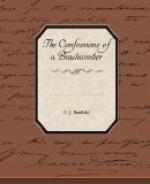At no season of the year is the island fragrantless. The prevailing perception may be of lush grasses mingled with the soft odour of their frail flowers; or the resin and honey of blossoming bloodwoods; or the essence from myriads of other eucalyptus leaves massaged by the winds. The incomparable beach-loving calophyllums yield a profuse but tender fragrance reminiscent of English meadow-sweet, and the flowers of a vigorous trailer (CANAVILA OBTUSIFOLIA), for ever exploring the bare sand at high-water mark, resembles the sweet-pea in form and perfume. The white cedar (Melia COMPOSITA) is a welcome and not unworthy substitute in appearance and perfume for English lilac. The aromatic pandanus and many varieties of acacia, each has its appointed time and season; while at odd intervals the air is saturated with the rich and far-spreading incense of the melaleuca, and for many weeks together with the honeyed excellence of the swamp mahogany (TRISTANIA SUAVOSLENS) and the over-rich cloyness of the cockatoo apple (CAREYA Australis). Strong and spicy are the odours of the plants and trees that gather on the edge of and crowd in the jungle, the so-called native ginger, nutmeg, quandong, milkwood, bean-tree, the kirri-cue of the blacks (EUPOMATIA LAURINA), koie-yan (FARADAYA SPLENDIDA), with its great white flowers and snowy fruit, and many others. Hoya, heavy and indolent, trails across and dangles from the rocks; the river mangrove dispenses its sweetness in an unexpected locality; and from the heart of the jungle come wafts of warm breath, which, mingling with exhalation from foliage and flower, is diffused broadcast. The odour of the jungle is definite—earthy somewhat, but of earth clean, wholesome and moist—the smell of moss, fern and fungus blended with balsam, spice and sweetness.
Many a time, home-returning at night—when the black contours of the island loomed up in the distance against the pure tropic sky tremulous with myriads of unsullied stars—has its tepid fragrance drifted across the water as a salutation and a greeting. It has long been a fancy of mine that the island has a distinctive odour, soft and pliant, rich and vigorous. Other mixtures of forest and jungle may smell as strong, but none has the rare blend which I recognise and gloat over whensoever, after infrequent absences for a day or two, I return to accept of it in grateful sniffs. In such a fervid and encouraging clime distillation is continuous and prodigious. Heat and moisture and a plethora of raw material, leaves, flowers, soft, sappy and fragrant woods, growing grass and moist earth, these are the essential elements for the manufacture of ethereal and soul-soothing odours suggestive of tangible flavours.
I know of but one particular plant that is absolutely repellent. Its large flowers are of vivid gold, pure and refined; the unmixed odour is obscene. A creeper of the jungle bears small yellow flowers (slightly resembling those of the mango, save that they are produced in frail loose cymes instead of on vigorous panicles), the excessive sweetness of which approaches nauseousness. But its essence mingles with the rest, and the compound is singularly rich and acceptable.




